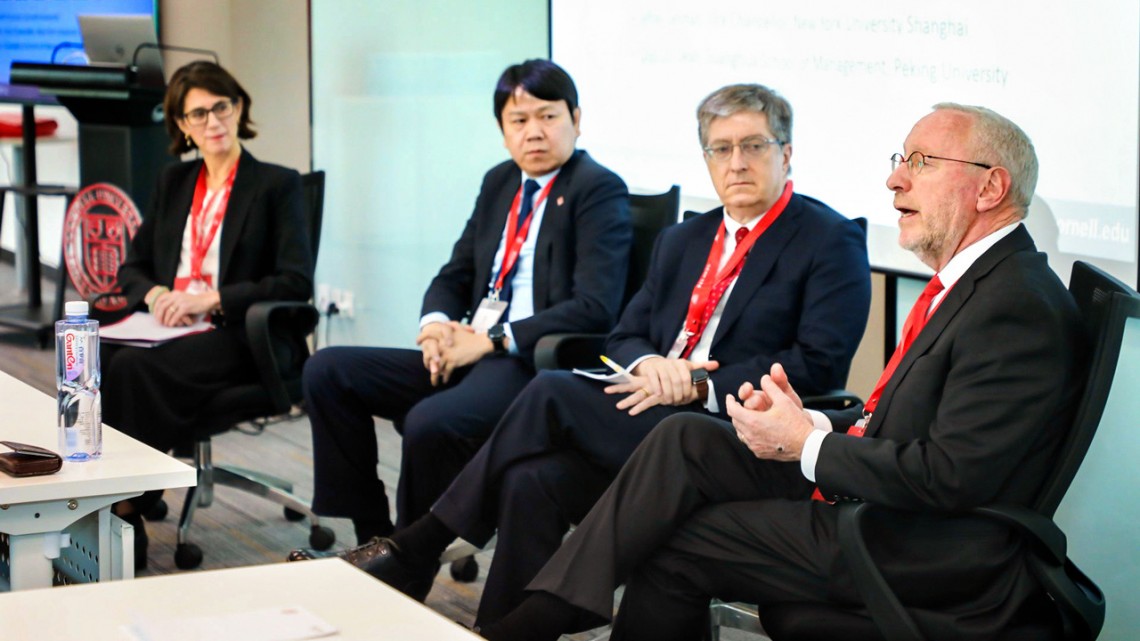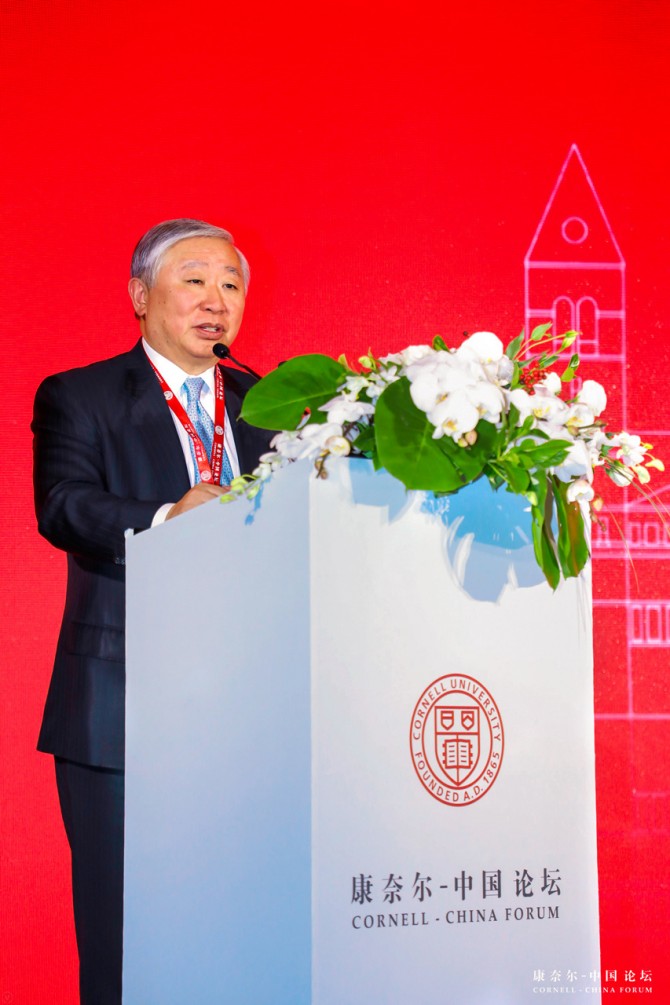
From left, Wendy Wolford, Cornell vice provost for international affairs, moderates a Nov. 18 panel of university leaders in Beijing including Peking University’s Guanghua School of Management Dean Qiao Liu; former Cornell President and current NYU Shanghai Vice Chancellor Jeffrey Lehman; and Cornell Provost Michael Kotlikoff.
Cornell China Center fosters collaboration at Beijing events
By Nina Chaopricha
Cornell taught its first Mandarin class in 1870 and graduated its first Chinese student in 1901. That student went on to become China’s ambassador to the United States and so began more than 100 years of collaboration between Cornell and China.
On Nov. 18, university leaders including President Martha E. Pollack, Provost Michael I. Kotlikoff, Board of Trustees Chair Robert S. Harrison ’76, faculty, alumni, collaborators and friends celebrated this long history with two events in Beijing: an academic symposium that brought together Cornell researchers with university partners from across China, and a Cornell-China forum.
“If one takes a long view of our global engagement, particularly in Asia, collaborations between Cornell faculty and students and our counterparts in China are both exciting and enormously important,” Kotlikoff said. “Cornell has the necessary depth and breadth of academic excellence, a strong tradition of collaboration across the borders of disciplines and nationalities, and a long-standing commitment to addressing the greatest challenges facing human society.”
Kotlikoff spoke at the afternoon forum as well at the morning symposium’s opening leadership panel, which also included Qiao Liu, dean of Peking University’s Guanghua School of Management, and Jeffrey Lehman, Cornell’s 11th president and current vice chancellor of NYU Shanghai.
The morning symposium, attended by around 60 researchers and senior leaders from Cornell and partner universities in China, was held in the new Cornell China Center office in Beijing’s central business district, a space that will host university and alumni events and serve as the center of a coordinated Cornell presence in China.
Cornell “remains exceptionally well-suited to conduct transformative interdisciplinary research that fuses humanistic and scientific insights,” Lehman said. “That kind of research holds the key to progress in areas like personalized wellness, beneficial artificial intelligence and sustainable global development. It is especially promising when conducted together with partners here in China.”
Although U.S.-China research partnerships are now facing “the most powerful headwinds they have faced in the past 40 years,” Lehman said, “radical decoupling would be a devastating overreaction. It threatens tremendous economic harm to the world. Even more importantly, it undermines a 40-year-long process of ever-deepening cultural, political and intellectual cooperation.”
In the afternoon, Pollack kicked off the inaugural Cornell-China Forum with an address, sharing examples of Cornell’s rich history of engagement, teaching and research with China. “We are the only land-grant university within the Ivy League, and as such we have a mandate, which we take very seriously, to not just create and disseminate knowledge, but to do so for the public good,” she said.
The forum, attended by more than 300 faculty, collaborators, alumni and friends, featured panelists from across academia and industry to address challenges and innovations in their fields and the potential for collaboration and impact across sectors.
Robert Harrison ’76, chairman of the university’s board of trustees, was the forum’s keynote speaker. In his talk, Harrison shared lessons on how to make an impact on a global scale, which he credits having learned through his leadership of the Clinton Global Initiative.
“Think big,” he said. “Stress measurement, scalability and sustainability. Work with industry, not against it. And encourage cooperation among the public sector, the private sector and civil society, because no single sector can address the world’s biggest challenges alone.”
Philanthropist Howard Milstein ’73 also addressed the crowd via a recorded greeting.
The forum featured four panels: Future Health Service and Health Tech; Food Safety and Digital Agriculture; Innovations for Future Urban Living; and Energy, Environment and Education.
In the health panel, Weill Cornell Medicine associate dean Michael Stewart said, “I’d love to see a way to teach the teachers to teach better and have a huge public health effect.” In the panel on food safety and digital agriculture, Martin Wiedmann, the Gellert Family Professor in Food Safety, and Kirstin Petersen, assistant professor of electrical and computer engineering, described their research in digital agriculture analytics.
“To move from technology innovation to systems innovation, we will need not just biology, chemistry and toxicology but also the social sciences,” Wiedmann said. “Cornell is well poised to make a difference in that area.”
In the panel on urban innovations, Randy Wan ’12, founder and CEO of InDeco, discussed the use of technology to shorten and automate the design process of office spaces and make good design more accessible.
“Spaces have to facilitate interaction, whether for a small company or … a major university or city,” said Jill Lerner ’75, principal at Kohn Pedersen Fox Associates.
The energy and environment panel featured winning projects from the 2019-20 Cornell China Innovation Grants and focused on innovations designed to help build environmentally sustainable practices.
Cornell Vice Provost for International Affairs Wendy Wolford and Cornell China Center Director Ying Hua concluded the forum, highlighting the value of connections and collaborations and expressing hope that the new office in Beijing can serve as both a window and bridge for Cornell in China.
Nina Chaopricha is the Ithaca campus coordinator of the Cornell China Center.
Media Contact
Get Cornell news delivered right to your inbox.
Subscribe


